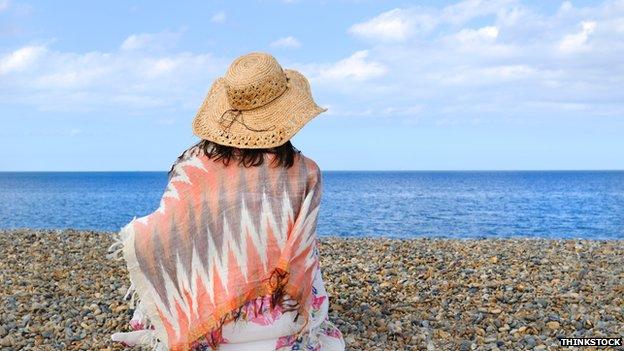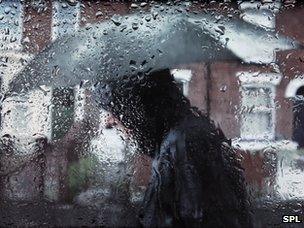Does sunshine make us happier?
- Published
- comments

As much of Britain basks in longed-for sunshine one senses that, despite all the economic gloom, our national spirits have been lifted. We instinctively believe that warm weather makes us happier. But is it true?
Yesterday's well-being statistics suggested the opposite. The happiest region of the whole UK is the most northerly - Shetland, Orkney and the Outer Hebrides. Some islands see only around 1,000 hours of sunshine a year compared to a UK average of 1,340 hours.
And when one reads those international lists of the happiest countries, top of the league tend to be places like Norway, Sweden, Canada, Denmark and Finland. There is no correlation between well-being and warm weather - if anything it looks like the opposite.
In 1998, psychologists David Shkade and Daniel Kahneman decided to test the theory that a sunny climate equates to a sunny disposition in a paper entitled Does Living in California Make People Happy?, external
The two professors had noticed what they described as "a stereotyped perception that people are happier in California… anchored in the perceived superiority of the California climate." So they compared the happiness of southern Californians with Midwesterners.
Two conclusions emerged from their research: firstly, Californians were no happier than people from the Midwest with its wind and rain; second, of all the factors that affected people's life satisfaction, weather was listed at the bottom. Midwesterners moaned about the weather more than Californians, but that didn't appear to make much difference to their overall contentment.
The scientists ended their paper with a homily. "It is not unlikely that some people might actually move to California in the mistaken belief that this would make them happier," they wrote. "Our research suggests a moral, and a warning: Nothing that you focus on will make as much difference as you think."
During the last few decades a significant amount of research has been conducted into the relationship between mood and weather, scientists looking for a link between atmospheric condition and personal disposition. Do high temperatures make people passionate? Does precipitation dampen enthusiasm? Are people happier in summer than in winter?
Analysis in the 70s and 80s variously suggested that high pressure, high temperature and low humidity were associated with positive emotions - basically, nice weather seemed to put people in a good mood. More recent research, however, has challenged this assertion with a number of studies suggesting the link is either very small or non-existent.
One paper published in 2008, external concluded that "the idea that pleasant weather increases people's positive mood in general is not supported by the findings of this study". The author, Jaap Denissen, accepted that his conclusions apparently contradicted common sense but insisted that there could be a number of factors to "explain the discrepancy between empirical results and widely held beliefs".
For example, it may be that historical associations between good weather and having enough food and shelter have been culturally transmitted down the ages. He also suggested that the discrepancy might be down to the impact on our thinking of a small number of extreme cases in which people's mental health is genuinely affected by the weather.
Seasonal Affective Disorder, or SAD, was first described and named by the South African psychiatrist Norman Rosenthal in 1984. He noticed that after his move from sub-tropical Johannesburg to seasonal New York he was less energetic and productive in the winter months. Often described as "winter blues", Rosenthal found the condition was more prevalent in northern latitudes: virtually no-one in sunny Florida was diagnosed with the condition while almost one in 10 of the population further north in New Hampshire was said to suffer from SAD.

At least it's good for the garden
In Britain, the disorder is thought to affect about 7% of people - most of them suffering during the winter months, but it applies to people who become depressed at the change of any season.
The Observer newspaper columnist Barbara Ellen has written about her experience, external of what is sometimes called reverse-SAD: "With me, SAD hits when the days get longer and brighter," she revealed. "I know when summer is coming because suddenly I feel wrong. I don't make sense in the summer, everything is too hot, too hopeless, too bewildering, I always feel I'm half a beat behind the world playing an eternal game of catch-up."
Science is still trying to make sense of what is going on. The link between cold, dark climates and depression seems so plausible and yet Icelanders exhibit remarkably low levels of SAD. Some suggest this might be down to a genetic factor (Canadians of Icelandic origin also appear to have lower levels of SAD), while others think they may be protected by eating lots of fish, a diet high in Vitamin D.
The NHS recommends the use of light boxes for people suffering from seasonal depression - although that treatment also appears to be useful for people with non-seasonal depression. Indeed, many psychiatrists now treat SAD, not as a separate condition to be blamed on the weather, but a manifestation of a patient's more general depressive or bipolar disorder.
The British public, it seems, remains largely committed to the view that if it lived in a warm, sunny environment instead of enduring waves of Atlantic cloud and rain, everyone would be a lot happier. For proof, people confidently assert that suicide rates are higher in countries straddling the Arctic Circle.

Summer has, at last, started
But proportionately, far more people kill themselves in the warmth of South Korea than in the ice of Scandinavia. Finland, which has the highest suicide rate of the Nordic nations, has a similar level to France and Belgium.
The Swedes have long tried to explode the myth that their climate makes them a depressive bunch, blaming a speech by President Eisenhower in 1960 for an association between European socialism and suicide. World Health Organisation data suggests Sweden's rate is roughly in line with South Africa, Hong Kong and New Zealand.
And yet I know that I feel chirpier when the gloomy days of a British winter give way to spring, when the clouds break and sunshine strokes my face, when the interminable flatness from creamy skies is replaced by sharp contrasts of light and shade.
Immediately following a rain shower, when the sun bursts out and sparkles on puddles through clean, fresh air, colours brighter and senses somehow keener, those moments are profoundly exhilarating. Perhaps it is not the sunshine that matters so much as the pleasure we get when our weather changes.